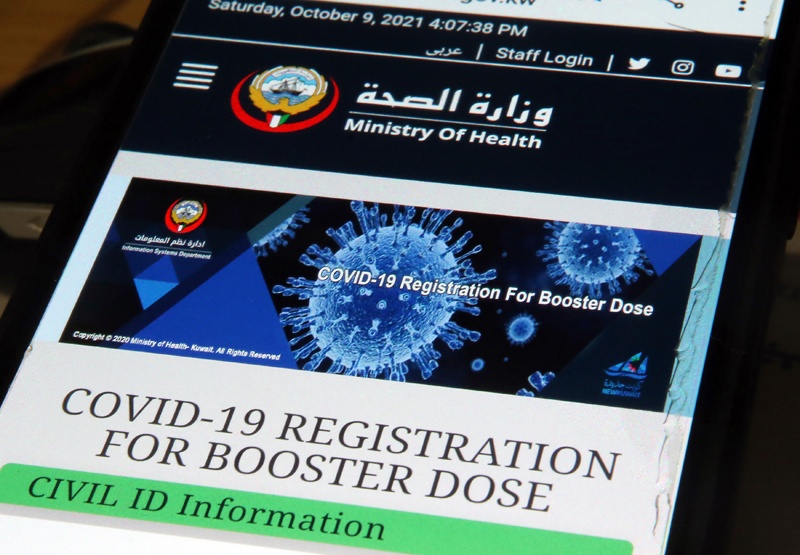KUWAIT/PARIS: A major study showed yesterday that cases of depression and anxiety surged by more than a quarter globally during the first year of the pandemic, especially among women and young adults. In the first worldwide estimate of the mental health impact of COVID-19, researchers estimated that 2020 saw an additional 52 million people suffer from major depressive disorder, and an additional 76 million cases of anxiety. These represent a 28- and 26-percent increase in the two disorders respectively, according to the study, published in The Lancet medical journal.
Meanwhile, Kuwait has introduced new mental health services to address complications caused by the coronavirus pandemic in the past 18 months. As life is returning to normal gradually with COVID-19 vaccination rates averaging over 70 percent, Kuwait Center for Mental Health (KCMH) has succeeded in promoting the importance of mental health to the public.
"The coronavirus pandemic forced countries around the world to close their borders and impose strict entry restrictions and quarantine. They restricted large gatherings in order to contain the spread of the virus, which largely affected some segments of the population, especially those suffering from mental health issues," Director of KCMH Dr Khulood Al-Ali said.
Amidst the devastating impact of COVID-19 on mental health, Dr Al-Ali told KUNA, World Mental Health Day, which is marked today, was an opportunity to raise awareness about mental health issues. COVID-19 affects the society in general, she added, and this could cause growing anxiety. She said mental health cases could rise to 50 percent following coronavirus infections.
Dr Al-Ali said the ministry of health formed a team to provide therapy for healthcare workers and people infected with the virus. The ministry also provided video messages to help people overcome the pandemic and think positively. There was also a support team to help people who were in quarantine or locked up during the lockdown periods, she said.
Dr Al-Ali said World Mental Health Day aims at raising awareness about the importance of having good mental health in order to address stress, depression, excessive anxiety and feeling of guilt. She said there are organizations that help in raising awareness about mental health and improving the way society looks at mental health patients.
Dr Ammar Al-Sayegh, head of the mental health department at KCMH, said the center was reaching out to the public in order to raise mental health awareness. Speaking to KUNA, Dr Al-Sayegh said COVID-19 has been impacting living and mental conditions of people around the world, in addition to restrictions on transportation and businesses coupled with hard-to-get healthcare. He commended media for spreading correct information about mental health conditions and explaining that mental health diseases were just like other diseases, which can be treated.
Meanwhile, the health ministry has started registration for the third dose or booster shot of the COVID-19 vaccine in individuals aged 18 years and older. Priority for the booster shot will be for high-risk individuals at least six months after their second dose, the ministry's spokesman Dr Abdullah Al-Sanad said in a press statement yesterday.
COVID-19 has claimed nearly 5 million lives since it emerged in late 2019, but experts say this is likely to be a vast underestimate. Friday's study showed that the hardest-hit countries were saddled with the greatest mental health burden, with a strong link between high COVID-19 case levels, restrictions on movement, and elevated rates of depression and anxiety.
"Our findings highlight an urgent need to strengthen mental health systems in order to address the growing burden of major depressive disorder and anxiety disorders worldwide," said lead study author Damian Santomauro, from the University of Queensland's School of Public Health. "Meeting the added demand for mental health services due to COVID-19 will be challenging, but taking no action should not be an option."
Analyzing data collected across North America, Europe and East Asia researchers modelled the expected prevalence of depression and anxiety. Had the pandemic not occurred, 193 million cases of depression would have been expected. This compared with an observed 246 million cases during 2020. Similarly, for anxiety, models predicted 298 million cases of anxiety globally without COVID-19, when in fact the actual number of cases last year was 374 million.
The analysis showed that women suffered disproportionately, largely because pandemic measures exacerbated existing health and social inequality in most nations. Additional caring and domestic duties still mainly fall to women, and women are far more likely to be victims of domestic violence, which surged during the pandemic. School and college closures restricted young people's ability to learn, interact with peers, and gain employment, leading to outsized mental health impacts among 20-24-year-olds, the study showed.
"The COVID-19 pandemic has exacerbated many existing inequalities, and social determinants of mental health disorders, and the underpinning mechanisms to improve mental health in the context of the COVID-19 pandemic globally," said Alize Ferrari, from the University of Queensland. "It is crucial that policymakers take underlying factors such as these into account as part of measures to strengthen mental health services."



